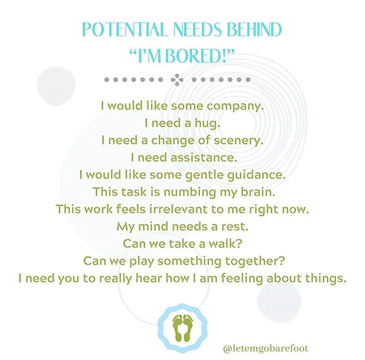Although stay-at-home orders have been lifted to an extent, children and teens are completing the school year at home and summer is around the corner. A phrase that you may have been hearing over the past few months is “I’m bored!”
Undeniably, you may be busier than ever before.
You may be your children’s new teacher, working from home, parenting more children during more hours of the day. You may also be working out of the home and trying to ensure that your children are caring for their responsibilities in a new environment. Regardless of your unique situation, you may be overwhelmed with tasks while your children reiterate their boredom. Hearing this from your children may make you feel as though you need to provide more things, more tasks, and more toys for them to be satisfied. It can also feel frustrating when you think that there are plenty of things to occupy their time.
Boredom can sometimes mean that your child wants new toys or a new activity, though, there are many other potential needs that aren’t being met. Your child expressing boredom may be their only way of asking.

Source: Instagram.com/letemgobarefoot
Children make basic statements to express complex needs
Missy Willis, M.Ed shares that “boredom is an expression. A need. Children are simplifiers. They make basic statements to express complex needs.” Mental and emotional needs may have taken a huge shift during this time at home. Children may be fearful, worried, overstimulated, overwhelmed, or underwhelmed. Children may crave structure or desire their weekly activities. All of these changes and many more can result in the blanket statement of boredom.
If you find yourself constantly telling your child to go play, feeling irritated at the grumbling, and arguing about the many activities that there are to do, Missy Willis, M.Ed asks you to “put your detective hat on and see what is really under the surface.” Have a mindful discussion with your child about what’s on their plate and on their mind. A 5-minute break with a loved one, going outside, having a dance party, or just listening can make a world of difference. Just like your needs are different during this time, so are theirs.
Sometimes children are just plain bored, but sometimes they have an unmet need that they’re unable to verbalize. You can’t be sure what’s going on without some detective work. Talk with your children, listen to your children, and be present with your children. Their needs may be easier to verbalize with your help.
Meghan Zeien, LMSW

